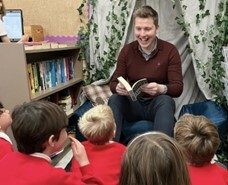- Home
- Curriculum
- Philosophy for Teaching English
Philosophy for Teaching English
Vision
The aim for English Curriculum is to promote high standards of language and literacy by equipping pupils with a strong command of the spoken and written language, and to develop their love of literature through reading for pleasure.
Intent
- To read easily, fluently and with good understanding
- To develop the habit of reading widely, and often, for pleasure and information
- To acquire a wide vocabulary, an understanding of grammar and knowledge of linguistic conventions for reading, writing and spoken language
- To write clearly, accurately and coherently, adapting their language and style for a range of contexts, purposes and audience
- use discussion to learn; they should be able to elaborate and explain clearly
At WJS, our curriculum is driven by a range of quality texts which seek to challenge and lead the development of the personal and cultural capital of the children attending our school. Texts provide a stimulus and opportunity to be immersed in rich vocabulary – one that will support development and nurture a genuine love of reading. We enrich English with visits from authors, trips and experiences that provide a real purpose for reading and writing. High quality texts are also used across the curriculum in our learning journeys.
We place a strong emphasis on identifying, exploring and absorbing new vocabulary. Children are both immersed in a language rich environment, with opportunities to hear and confidently experiment with new words, and they are explicitly taught new vocabulary. The words we use in our curriculum can be thought about in three types or tiers. We use Tier 1 words every day in the classroom. Tier 2 and tier 3 words are strategically selected and taught explicitly within English and foundation subjects. Teaching this vocabulary in context is crucial for learners if they are to develop a robust knowledge and understanding of the terminology they are being introduced to.
Supporting children to understand and use a wide range of Tier 2 and 3 words throughout Key Stage 2 is an important part of preparing children for the increasing complexity of vocabulary they are likely to encounter in secondary school.
Writing
Writing:
Writing is taught through a sequential journey – ‘the writing framework’ that is based around a high-quality text or extract. Work is planned over a 3 or 4 week sequence: immerse, build and write. Children are given individual ‘magic 3 targets’ which are the specific skills they need to work on in order to improve their writing.
Immerse 1: explicit vocabulary instruction of tier 2 words that are selected from the model text
Immerse 2: oracy, and drama to better understand the structure of the genre
Build: building of skills and sentence structure, including grammar
Write: A final written piece where children choose the context within the specific genre and apply all the skills learnt across the unit
Children will take pride in their presentation using a cursive script for handwriting, valuing the editing and revising process as part of the writing journey.
Non-negotiables:
There are progressive non-negotiables for each year group. These place emphasis on key skills that are essential for writing and relate to spelling, punctuation and presentation.
Reading
Our aim at WJS is to create readers, not just children who can read.
We promote a love of reading and children are exposed to a variety of authors from the past through to the present, promoting a range of genres with non-fiction and fiction texts. Our learning environments all have reading areas which support opportunities and spaces to develop the enjoyment of reading. These all have input from the children and so will look different between classes.
Lessons are organised as follows:
- 1 hour reading lesson
- 30 minute comprehension lesson
The hour Reading lesson includes a combination of teaching reading aloud and pupils reading; both interspersed with discussions and explanations and modelling.
Teacher modelling and explanations might touch on the following:
- How to combine ideas in the text and background knowledge
- Decoding unfamiliar words
- Commenting and considering the impact of words or phrases
- Modelling how a skilled reader fills in the gaps
Book Club also forms 15 minutes of our longer reading lesson. This is a timetabled space for browsing, exploring and discussing books as well as hearing and giving recommendations.
Children who need support with Reading are identified quickly and given appropriate support for example phonics rapid catch up, regular reading, high priority within lessons and adaptive teaching strategies.





